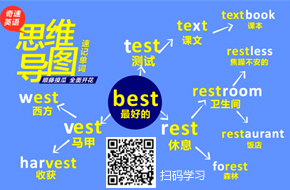that,if 和 whatever 引导的宾语从句:
★ 宾语从句中连接词的选择
1. 由 that 引导的宾语从句:that 在从句中无词义,不作任何成分,常可省略。如:
Jenny said (that) she could finish her painting before supper.
I think (that) you are right.
2. 由 if 或 whether 引导的宾语从句:if 或 whether 引导宾语从句时,一般可通用,都表示“是否”。如:
I don't know if / whether she still works there.
I want to know if / whether there is a hospital in this street.
但在下列情况下,只能用 whether,而不能用 if:
(1)在 whether ... or not 或 whether or not 结构中,不能用 if。如:
Nobody knows whether or not it will rain.
(2)在介词之后用 whether。如:
I'm interested in whether he likes English.
★ 主从句时态的呼应
当主句是一般现在时态时,从句可用各种时态;
当主句是一般过去时态时,从句常用过去的某种时态。
但当从句叙述的是客观事实或一般真理时,即使主句为过去时,宾语从句仍然用一般现在时态。如:
He said he would spend his holiday in Dalian.
Our geography teacher told us that the sun rises in the east.
【四川乐山】30.-Thank you for telling me so much knowledge about nature.
-Don't mention it. _____ you have more questions,come to me any time.
A.If
B.Because
C.Though
①肯定陈述句+否定提问。如:
Lily is a student isn't she?
Lily will go to China,won't she?
②否定陈述句+肯定提问。如:
She doesn't come from China,does she?
You haven't finished homework,have you?
③提问部分用代词而不用名词如:
Lily is a student,isn't she?
④陈述句中含有否定意义的词
如:little,few,never,nothing,hard 等,其反意疑问句用肯定式。
如:He knows little English,does he?他一点也不懂英语,不是吗?
1.spend 动词,表示“花费金钱、时间"
①spend...on sth.在某事上花费(金钱、时间)
②spend...doing sth.花费(金钱、时间)去做某事
如:
He spends too much time on clothes.他花费太多的时间在衣着上。(花金钱)
He spend 3 months building the bridge.他花费了三个月去建这座桥。(花时间)
2. pay 的基本用法是:
① pay(sb.)money for sth. 花费钱(给某人)买。
② pay for sth. 付……的钱。
③ pay for sb. 替某人付钱。
④ pay sb. 付钱给某人。
⑤ pay money back. 还钱。
⑥ pay off one's money. 还清钱。
如:
① I pay 10 yuan for the book. 我花了 10 元买这本书。
② I have to pay for the book lost. 我不得不赔丢失的书款。
③ Don't wory! I'll pay for you. 别担心,我会给你付钱的。
④ They pay us every month. 他们每月给我们报酬。
3. take 后面常跟双宾语,常见用法有以下几种:
① It takes sb.+时间+to do sth. 做某事花了某人多少时间。
② doing sth.takes sb.+时间,做某事花了某人多少时间。
如:
① It took them three years to build this road.他们用了三年时间修完了这条路。
② Repairing this car took him the whole afternoon.他花了一下午修车。
4.cost 的主语是物或某种活动,还可以表示”值”,常见用法如下:
① sth. costs(sb.)+金钱,某物花了(某人)多少钱。
② (doing)sth.costs(sb).时间,某物(做某事)花了(某人)多少时间。
注意:cost 的过去式及过去分词都是cost,并且不能用于被动句。
如:
① A new computer costs a lot of money.一台新电脑要花一大笔钱。
② Remembering these new words cost him a lot of time.他花了大量时间才记住了这些单词。
1.【湖南长沙】Tom spent 200 yuan ______ this book.
A.in B.on
C.for D.with
2.【广东深圳】It ______ me two days to finish the work.
A.took B.cost
C.spent D.paid
3.【天津】34.I ______ some of my free time playing basketball for my school team.
A.spend B.cost
C.take D.pay
4.【四川宜宾】24.I ______ $300 for the bike.
A.took B.spent
C.cost D.paid

Unit 3:Could you please tell me
where the restrooms are?
第三单元的语法重点是:宾语从句;语态;倒装句;程度副词。
连接代词和连接副词引导的宾语从句。
1. 由连接代词 who, whom, whose, what, which 等引导,不能省略。例如:
Do you know who he is?
2. 由连接副词 how, where, when, why 引导, 也不可省略。例如:
I don't know where I can buy this kind of camera.
3. 宾语从句用陈述句语序,即:连接词 + 主语 + 谓语 + 其他。
4. 主句与从句的时态关系:
(1) 如果主句是一般现在时,从句可以是根据情况所需要的任何时态。例如:
I don't know when she came here.
Can you tell me when he will come here?
(2) 如果主句是过去的时态,从句也应用过去时态的某一种。但若从句是表示客观事实或真理时,从句时态不受主句时态的限制,应用一般现在时。例如:
He told us why he would stay at home the next day.
The teacher explained how the earth goes around the sun.
5. 某些由连接代词或连接副词引导的宾语从句可改为含“特殊疑问词 + 动词不定式”结构的简单句。例如:
Can you tell me where I can buy this book?
→ Can you tell me where to buy this book?
1.【2017南昆明】33.—Could you please tell me ____ ?
一The people and the food.
A.how does Tom like China
B.if Tom likes China
C.what does Tom like about China
D.what Tom likes about China
2.【2017广西贵港】44.—Could you tell me ______ ?
—Sure.A story book.
A.when did your friend give it to you
B.what did your friend give you
C.how your friend got to the supermarket
D.what your friend gave you
① 英语有两种语态:主动语态和被动语态
主动语态表示主语是动作的执行者
被动语态表示主语是动作的承受者
② 被动语态的构成
由“助动词 be+及物动词的过去分词”构成
助动词 be 有人称、数和时态的变化,其变化规则与 be 作为连系动词时完全一样。

③ 被动语态的用法
当我们不知道谁是动作的执行者,或者没有必要指出谁是动作的执行者,或者只需强调动作的承受者时,用被动语态。
由 so+助动词(be/do/will/have)情态动词+主语 意为:…也是一样
例如:
She is a student.So am I. 她是一个学生,我也是。
She went to school just now.So did I. 她刚才去学校了,我也是
She has finished the work.So have I. 她已经完成了工作,我也完成了。
She will go to school.So will he. 她将去学校,他也是。
程度副词:
always 总是
usually 经常
sometimes 有时
never 从不
如:
I am always/usually/sometimes/never late for school.
我总是经常/有时/从不上学迟到。
温馨提示:版权归原作者所有,推广的内容如有侵权,请您告知我们会在第一时间处理或撤销;互联网是一个资源共享的生态圈,我们崇尚分享。
1.思维导图英语故事创作课程:运用思维导图联想发散的特点,围绕中心词联想相关词汇和语境,独立创作个性化英文故事,并把独立创作的故事表演出来。本课程适合6-15岁学生。这是一门能够激发学生的学习兴趣和潜能,培养学生的语言能力、发散思维能力、表演能力以及创新思维的课程。详情咨询添加老师微信:17760376675
2.高中《一本小说24个故事串记3500词汇》:围绕着每个故事都进行了词汇、句型、写作、完型等方面的扩展,涵盖了词汇、语法、写作、阅读等大纲要求的模块。因此,学生可以在享受故事情节的轻松时刻,同时于潜移默化中牢记中学考纲里的单词。
3.初中/高中《快速阅读写作》课程:是一套全方位系统讲解与针对训练相结合的高品质课程,通过独创思维导图和名师教学引导,培养学生分析归纳、推理检验的英语阅读能力。奇速英语26招快速阅读扫除阅读中所有疑难杂症。配套针对性强化训练,学以致用,举一反三,快速高效提升学生的英文阅读能力。详情咨询添加老师微信:17760376675
中小学生进行英语听说读写诊断,还能帮助孩子尽快适应新学期节奏,激发出孩子们英语单词阅读的学习兴趣。既解决了家长辅导孩子学习之苦,也能进一步提高孩子的学习动力。详情咨询添加老师微信:17760376675
奇速通英语智能学习机内置奇速英语精品套装:思维导图记单词、24个故事串记高中3500词汇、英语快速阅读写作、8招突破核心语法、英语时文个性阅读、大数据分析及智能推送等;大屏护眼,无法游戏,减负增效!
语智能学习机内置奇速英语精品套装:思维导图记单词、24个故事串记高中3500词汇、英语快速阅读写作、8招突破核心语法、英语时文个性阅读、大数据分析及智能推送等;大屏护眼,无法游戏,减负增效!











